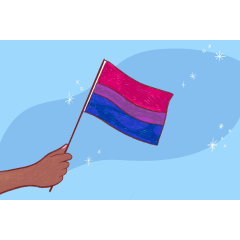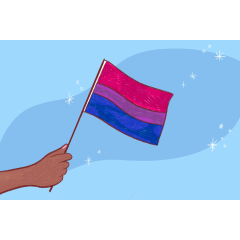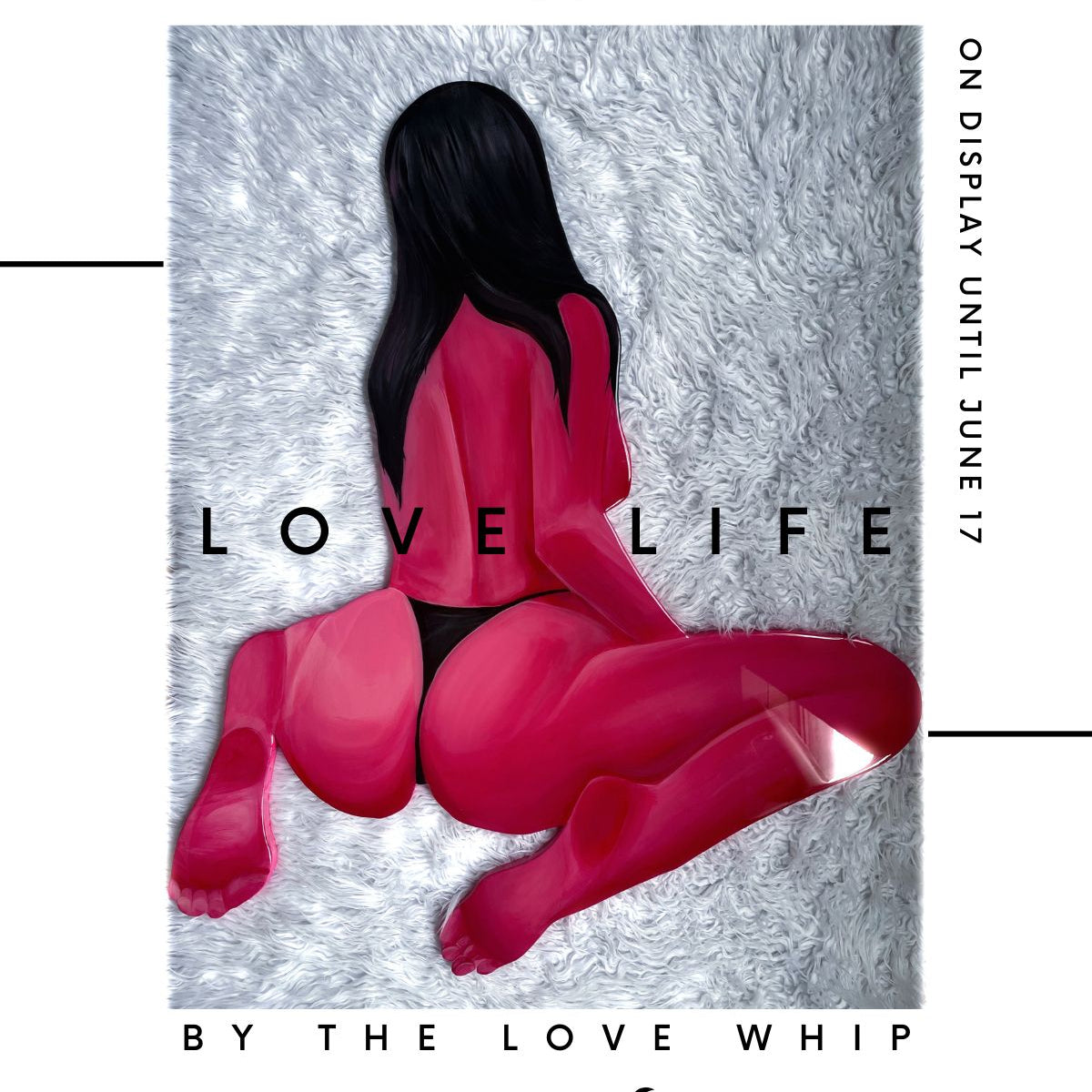Bi Bi Bi - a SHAG Mini-Workshop

March 23, 2023

Watch on IG @weloveshag
YouTube @weloveshag
Welcome. Hello! Thank you all for coming. My name is Artemis. I use she/they pronouns. I'm going to talk a little bit about bisexuality today.

I'm going to first shout out to today's sponsor. Everybody who came to the store today got a couple of little products from Exsens — a women-owned small production lube and body oil company in Canada, and they're sponsoring our workshops. So, thank you, Exsens! Everybody today got a White Peach flavored, edible, Warming Body Massage Oil and an Aloe Vera Water-based Lubricant.


So, bisexuality, what's the deal? I was talking to my friend about doing this workshop and they said, “What's the workshop part? It's not like a knot-tying workshop where you're going to learn.” I said, “Well, everyone's going to turn to the right and kiss somebody and then turn to the left and kiss somebody, and then you're a bisexual and then we did it!” This is going to be, obviously, more theory and talk about some of the unique challenges, stereotypes, and experiences that bisexual people might go through.
First, a little bit of history: the word bisexual was coined in the 19th century, actually at the same time as heterosexual and homosexual. A big benchmark in the sexological study of bisexuality came in the 1940s when a researcher named Alfred Kinsey studied homosexual activity in men and developed what he called the Kinsey scale. Maybe you’ve heard of this. The Kinsey scale basically said that if you experience exclusively heterosexual attraction, then you're a zero. And if you experience exclusively homosexual attraction, you're a six. And then if you're anywhere in the middle, you can fall somewhere in here. Obviously, this is not a perfect system.
What do we think are some issues with this? There's no nuance. It's very one literally one linear dimension. What else? Why the number six? Why are we trying to use a number at all? It feels like you're trying to get a high score. I see this and I'm like, I want to do the best job. I want to get an A. I want to get the highest score. Also, he only studied math. What's that about? What's going on there?
But credit to him, because he discovered something crazy — that around 48% of his participants had some level of homosexual experience. There were some parameters, like post-adolescence, and having reached orgasm, which I think is really funny. He seemed to be saying, if you just kiss that doesn’t count, but if you finish, you're gay now. This was an early attempt at putting people into these boxes. Now, we have a lot more language, a lot more visibility, a lot more communication about sexuality and gender.
Today we're talking about multi-sexuality, which is just attraction to more than one gender, as opposed to mono-sexuality, which would be like being straight, gay, or lesbian in strict terms. I found a definition that I like from a bisexual activist, theorist, and writer called Robyn Ochs who says, “Bisexuality is the potential to be attracted romantically and/or sexually to people of more than one sex and/or gender, not necessarily at the same time, not necessarily in the same way, and not necessarily to the same degree.” There's a lot of caveats with that. People wonder why we're confused! I think part of the value of that definition is that it's so amorphous. Human behavior and human sexuality, and this is something I'm going to come back to throughout this little talk, is something that really eludes neat categorizing and labeling. Despite bisexuality and queerness of all kinds being present in recorded history, literally as far back as we can see, we're still trying to pin sexuality down, to name it, put it in a box and say, “okay, this is something we understand now.”
I want to make a distinction that bisexual does not mean attracted to both genders. There is a recent discourse that's been happening as we have a greater understanding and literacy in gender theory. Many people mistakenly believe the “bi” in bisexual to imply that there are two, and only two, distinct, discrete genders, and that all sexuality can therefore be categorized as being attracted to one, or the other, or both. We're trying to move away from that. Bisexuality is like an umbrella that can still fit many other labels under it, such as “pansexuality,” which is an attempt to get around that association with the two genders. Pansexuality comes from the prefix “pan,” meaning “all.” It's defined as attraction to people regardless of their gender.
I could spend the next hour talking about labels, but I do want to cover a few, including “queer.” Queer is a really big term that covers a lot of bases. In its strictest sense, it is just an identity outside of normative heterosexuality. Because of its status as a reclaimed slur, it has political weight. There's an ever-relevant quote from Bell Hooks that maybe some of you have heard that says queerness is “not as being about who you’re having sex with — that can be a dimension of it — but queer as being about the self that is at odds with everything around it and it has to invent and create and find a place to speak and to thrive and to live.” The idea is that being queer is a sexual orientation, but also a worldview and a political stance.
You may also have heard terms like “hetero” or “homo” “flexible.” This is a way someone might describe themselves if they're predominantly straight but open to something or exploring. This is similar to people who are “questioning” or people who identify as “bicurious.” This is not necessarily a spot that someone is passing through. It's not necessarily a process of, “oh, you're bicurious now, but then you're going to be bisexual later,” or “you're bicurious now and then you're going to be gay later.” Bicurious or questioning or flexible can be the destination. And that identity can feel right for any amount of time! For years or for but a night. One magic night! Some folks identify as “fluid” in their sexuality, which is to acknowledge that throughout all of our lives we are changing, growing, and shifting. Truly, all sexual identities and genders have the potential to be fluid and change over the course of time, but to identify as “fluid” is to really accentuate the shifting nature of sexual identity as a whole. People can also describe themselves as “gynosexual” (or "gynesexual") or “androsexual.” This would be people who are attracted to femininity, feminine energy, fem of center people, feminine expression — although what the hell is even that? And then androsexual would be people who are attracted to masculinity, people masc of center, or the like. Then there’s the term “sapphic,” which some people experience as less binding than “lesbian,” but still associated with lesbianism and lesbian culture. One thing I didn't know this until today when I looked it up is that the gay male equivalent of Sappho is Achilles. I love that! Achilles: so cool. Achilles: gay icon! Personally, I'm bisexual and I'm pansexual, but I think I sometimes identify or associate more with Sapphic spaces and Sapphic energy. That's where I'm more comfortable. All of these things — these labels, words, vocab, these invented things — are just ways of communicating. It's not like you need to say it and then it gets tattooed to your face forever. It’s not as though you pick a label and then have to follow all the rules of that label, or culture, or identity. These words can even be used to describe just the way you're feeling right now, this moment.
Stay tuned for part 2! But for now, bye bye bye...
**This text was transcribed from SHAG’s live Mini-Workshop on March 23, 2023 and edited for clarity. This opinion piece is not intended to constitute licensed expert advice; all content is for general informational purposes only.**




Comments